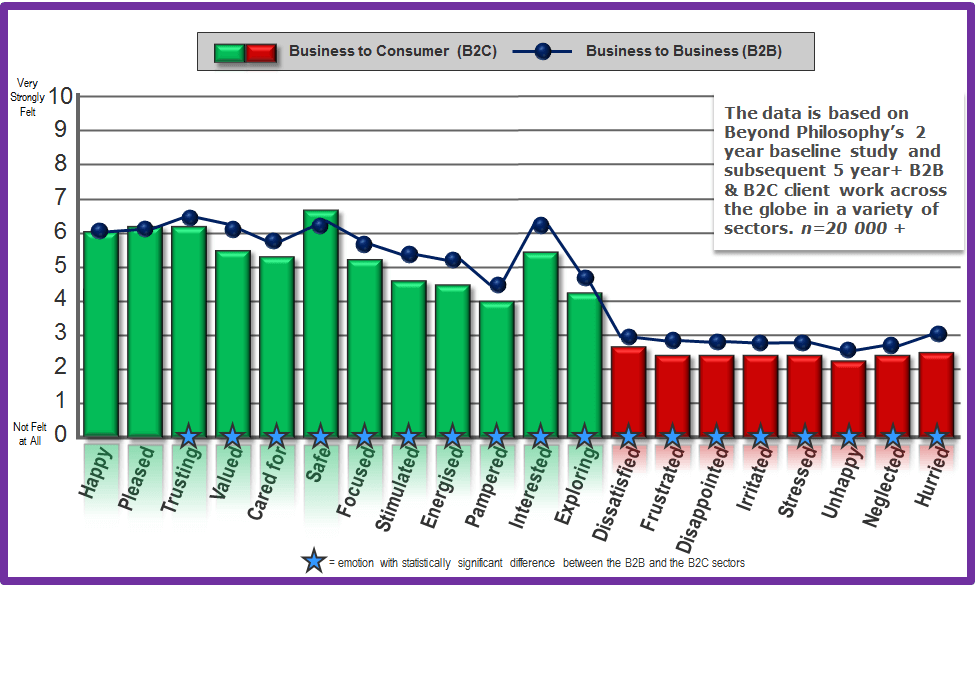Do emotions play a role in the business to business (B2B) environment? Do the emotions that influence us as consumers also influence our behaviour in our jobs? We often get asked these questions and most recently during our last webinar New research of top emotional touch points: Case studies of how to drive emotional engagement. The other thing we often hear people say is: “ours is a bit of no-nonsense industry, not sure if emotions play a role”.
The answer to all these questions is “yes”, emotions do play a role in the business to business environment. As long as there are people involved in making decisions (we have also worked with companies who try to eliminate the human element in decision making at some stages) emotions will be influencing our decisions and behaviours even though we may not necessarily be aware of that. Would you say that relationship and trust are important for your business to business dealings? Well trust is an emotion and for there to be a true relationship there must also be emotions.
As with everything we do, whilst our logic and experience says the above is true, we looked to our database for evidence if in fact there are differences between the business to consumer and business to business sectors in how they feel emotionally.
What we found was quite interesting. Overall the business to business (B2B) experience is more emotional than the business to consumer (B2C) experience. If you look at the graph below, the green and red bars represent how consumers feel towards businesses we have worked with (B2C). The higher the bars the more that emotion is felt in the experience. The blue line with balls marks how business people feel as a client of other businesses we have worked with (B2B). As you can see from the graph below the B2B line (the blue line with blue balls) is above the green and red bars (representing the B2C emotional profile) on all but one emotion – safe.
We tested these to see if they are statistically significantly different and we found that all but happy and pleased are. That means that B2B and B2C feel equally happy and pleased but on all other emotions the differences are significant.
So what are those differences?
First, apart from safe, B2B customers feel the positive emotions to a higher extent in the experience. Why? In most cases businesses can make the experience more personalised. Unlike the mass consumer market in the B2B environment you often get “account managers”. Businesses know that decision makers can shift considerable amount of business towards them or alternatively to take it away from them. They have also done a lot of analysis on their “influencers”, “gate keepers” etc. Once the key players have been identified most businesses try to build a relationship or gain their trust. Thus many businesses focus on some emotions whist not necessarily realising it. The key question is; are they focusing on the right emotions e.g. the ones that will drive the action they want from their customers.
For example one of the largest shipping companies in the world – Maersk Line, decided to focus their experience on three target emotions that drove the most value – trust, cared for, pleased. They did that to mark the transition from a transaction driven “A to B” type organisation to one that focuses on how customers feel. Three years after that the company increased their Net Promoter Score® by 40% points. Read the full story on how they did it here.
Why do B2B customers feel less “safe” than B2C customers? Well as a start, first objective for most working people is not to make a mistake that can cost them their job. When their job depends to an extent from how well they interact with a supplier and to the extent to which the supplier does a good job, essentially they put the safety of their own reputation and career at stake.
A telecom in Europe understood well this difference between the B2C and B2B customers. They realized that B2B customers needed reassurance e.g. just someone to check at the end on the call that they get what they needed and to assure then that things will happen as discussed and are on track.
For those same reasons, B2B customers feel the negative emotions to a higher extent compared to B2C customers. Many people go to bed and wake up with their work in mind and they are much more sensitive to anything that will impact their own work or put their job at risk. They also have higher expectations in many cases. They are not just one consumer in a pool of millions or hundreds of millions; they are a decision maker, influencer or gatekeeper of a company that gives considerable amount of business to the other side and demand that extra respect.
| Zhecho Dobrev is a consultant and project manager for Beyond Philosophy. He has worked with a wide array of large corporate companies. Zhecho’s expertise includes customer behaviour analytics, customer loyalty, complaints management and journey mapping. He holds an MBA and Master’s degree in International Relations. Zhecho Dobrev on Twitter @Zhecho_BeyondP |



